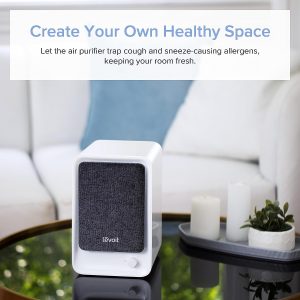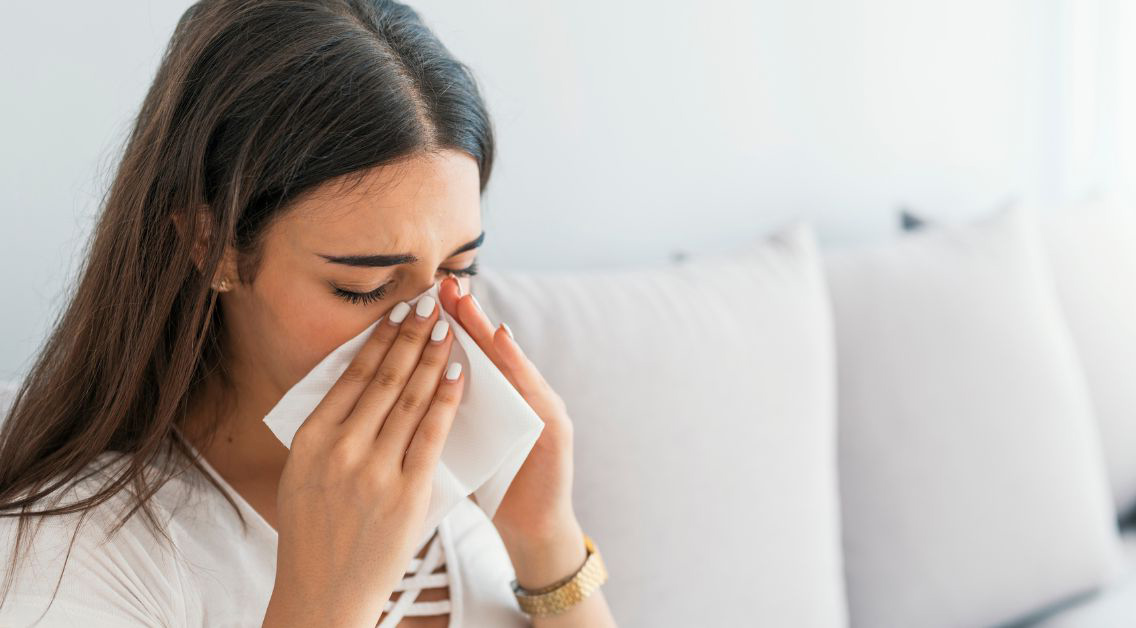We shall investigate in this essay whether a home air purifier helps relieve seasonal allergies. We’ll go through the operation of air purifiers, the kinds of filters they employ, and how well they work at removing allergens from the air. We’ll also go through the advantages of utilizing an air purifier and offer some advice on how to pick the best one for your need. You will know more by the conclusion of this essay about whether a home air purifier can help you manage seasonal allergies.
What are Seasonal Allergies?
Hay fever and allergic rhinitis are two other names for allergic reactions that only happen at certain periods of the year, usually when particular plants release pollen into the atmosphere. Seasonal allergies are one of these allergic reactions. Depending on the sorts of allergens in the air, this may occur in the spring, summer, or fall. The symptoms of these allergies, which can range from little annoyance to excruciating agony, can have a significant impact on a person’s quality of life.
Understanding seasonal allergies
It’s critical to recognize that the immune system plays a significant role in the development of seasonal allergies in order to comprehend how they function. An allergic person’s immune system wrongly interprets an allergen, such as pollen, as a threat when it enters their body. Histamine and other substances are released by the immune system in response to the perceived threat. Sneezing, runny nose, itchy eyes, and congestion are common symptoms of seasonal allergies brought on by this chemical release.
Causes of seasonal allergies
Plant pollen from weeds, grasses, and trees is the primary cause of seasonal allergies. When these plants discharge pollen into the atmosphere, allergy sufferers may breathe it in and experience an allergic reaction. Mold spores, pet dander, and dust mites are other allergens that may contribute to seasonal allergies.
Symptoms of Seasonal Allergies
Common symptoms of seasonal allergies
Numerous symptoms, ranging in severity from mild to severe, can be brought on by seasonal allergies. Typical signs include:
- Sneezing
- runny or congested nose
- wet or itchy eyes
- throat discomfort
- Coughing
- Fatigue
It’s crucial to keep in mind that not everyone who suffers from seasonal allergies will experience all of these symptoms, and the intensity of symptoms might differ from person to person.
Severe symptoms of seasonal allergies
Seasonal allergies occasionally result in more severe symptoms that can seriously interfere with day-to-day activities. These serious signs could consist of:
- respiratory issues or lack of breath
- A constricted chest or wheezing
- ongoing cough
- Headaches
- facial pressure or pain
It is crucial to get medical assistance if you have any of these severe symptoms since they could be signs of a more serious allergic response or other medical condition.
How Do Air Purifiers Work?
Principles of air purification
In order to filter out pollutants, allergies, and other airborne particles, Air purifiers clean the air in the immediate vicinity. Getting rid of these particles before they may be ingested and cause an allergic reaction is the basic idea underlying air purification. The majority of air purifiers accomplish this by using filters, while different models employ a variety of processes.
Types of air purifiers
There are various types of air purifiers on the market, each with unique capabilities and characteristics. The most typical varieties include:
- Pollen, dust mites, pet dander, and mold spores are all examples of the microscopic particles that HEPA (High-Efficiency Particulate Air) filters are made to collect.
- Filters made of activated carbon are good in removing gases, smells, and volatile organic compounds (VOCs) from the air.
- Electrostatic filters: These filters draw and capture particles using an electrostatic charge.
- UV-C light filters: These filters eliminate bacteria, viruses, and other microbes by using ultraviolet light.
For thorough filtration, certain air purifiers may combine different filtering techniques.
Benefits of Using Air Purifiers for Seasonal Allergies
Reduction of allergens in the air
Reducing airborne allergens is one of the main advantages of utilizing air purifiers for seasonal allergies. Pollen, dust mites, mold spores, and other allergens can be successfully captured by HEPA filters, keeping them from circulating in the air and causing allergic reactions. Air purifiers can lessen the symptoms of seasonal allergies by eliminating these allergens from the air.
Relief from allergy symptoms
Air purifiers can ease allergy symptoms by lowering the concentrations of allergens in the air. There will be less occasions for the immune system to retaliate when there are fewer airborne allergens, which will reduce symptoms like sneezing, runny nose, and itchy eyes. For those who suffer from seasonal allergies, this respite can significantly raise their quality of life and make it easier for them to go about their everyday lives.
Improved air quality in the home
Air purifiers not only eliminate airborne allergens but also enhance indoor air quality. They may remove pet dander, dust, smoke, and other pollutants from the air, making the indoor atmosphere cleaner and healthier. For those who have respiratory issues or allergies to airborne particles, this may be very helpful.
Choosing the Right Home Air Purifier
Considerations for selecting an air purifier
There are a few things to consider when choosing an air filter for seasonal allergies:
- Determine the area in square feet of the room that will house the air purifier. This will aid in determining the necessary purifier’s proper size and capacity.
- Sensitivity to allergens: Take into account the precise allergens that set off your seasonal allergies. Look for an air purifier that is built to filter out such allergens effectively.
- Noise level: When operating at higher speeds, certain air purifiers can be quite loud. Consider models with quieter operation if noise is an issue.
- Energy efficiency: To reduce the expense of electricity, look for air purifiers that are energy-efficient and consume little power.
Features to look for
An air purifier’s functionality and convenience may be improved by certain characteristics. These may consist of:
- Various fan speeds: Enables customization depending on particular requirements and preferences.
- Utilizes less energy by allowing the purifier to run for a predetermined period of time.
- When it’s time to replace the filters, the filter replacement indication lets you know, ensuring optimum performance.
- Remote control: Makes it simple and convenient to change the settings while standing a distance away.
Proper maintenance of air purifiers
Regular maintenance is required to guarantee an air purifier’s continued efficacy. Typically, this comprises
- following the manufacturer’s directions for changing the filters.
- Regularly cleaning the outside and housing of the purifier.
- In order to get rid of accumulated dust and debris, vacuum the pre-filter.
The functionality and durability of the air purifier will be maintained by adhering to the manufacturer’s maintenance recommendations.
Other Allergy Prevention Techniques
There are several methods that can help prevent and treat seasonal allergies besides utilizing air purifiers:
Keeping windows and doors closed
It is advised to keep windows and doors closed at allergy season’s peak to keep pollen and other allergens out of the house. To move filtered air around the interior, if necessary, utilize fans or air conditioning.
Regular cleaning and dusting
Pet dander and other allergies can be removed from surfaces in the home by routinely cleaning and dusting. To effectively remove these allergens, use a moist cloth or a vacuum with a HEPA filter.
Using allergy-friendly bedding
Dust mite settlement and accumulation can be avoided by using allergen-proof covers on pillows, mattresses, and duvets. Furthermore, often washing bedding in hot water can help get rid of allergies and keep the bedroom clean.

Debunking Common Myths
Air purifiers as the sole solution for allergies
While air purifiers can considerably reduce airborne allergens, treating allergies shouldn’t be based solely on their use. Seasonal allergy management also involves taking other steps, such as avoiding triggers, taking medicine as directed by a doctor, and practicing excellent hygiene.
Air purifiers eliminating all allergens
Despite the fact that air purifiers are excellent in lowering airborne allergens, it’s crucial to remember that they do not completely remove all allergens from the atmosphere. On surfaces, in carpets, and in other places that air purifiers might not be able to reach, allergens can still be detected. For best results, it’s crucial to utilize air purifiers in conjunction with other allergy avoidance techniques.
Possible Side Effects
Potential health risks
Although using air purifiers is typically safe, some people may encounter negative side effects. If the air purifier is not properly maintained or the filters are not changed on a regular basis, these could include dryness or irritation of the eyes, throat, or skin. Additionally, those who suffer from respiratory diseases like asthma may be more susceptible to the changes in air quality that air purifiers might bring about.
Precautions to take
It’s crucial to maintain the air purifier properly and adhere to manufacturer directions to reduce the possibility of negative effects. This entails routine filter replacement, purifier cleaning, and monitoring of any potential symptoms or discomfort.
Consulting a Professional
Seeking expert advice
It is advised to consult a healthcare expert or allergy specialist for guidance if you are unsure whether an air purifier is suitable for your unique allergy needs. Depending on your particular scenario, they can offer recommendations that are tailored to you.
Evaluating individual needs
When thinking about an air purifier, it’s crucial to examine your specific needs because allergy triggers and symptoms might differ from person to person. To make sure you get an air purifier that is practical for your scenario, consider aspects like the severity of your allergies, the size of your living area, and specific allergens.
Conclusion
In conclusion, using a home air purifier to manage seasonal allergies can be quite helpful. Air purifiers function by lowering the concentrations of allergens in the air, relieving symptoms, and enhancing air quality in general. You can improve the quality of your surroundings and lessen the discomfort brought on by seasonal allergies by using an air purifier in conjunction with other allergy avoidance methods, such as keeping windows closed and routine cleaning.
If you experience seasonal allergies, it’s worthwhile to look into your allergy relief choices and weigh the advantages of a home air purifier. An air purifier can be a helpful addition to your allergy management strategy with the right selection, use, and maintenance, allowing you to breathe easier and take pleasure in the changing seasons without the pain of allergic reactions.

